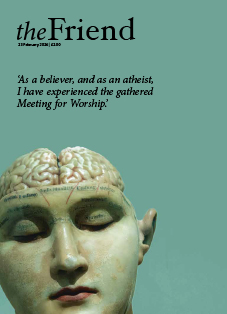
The Friend is a weekly magazine in which Friends speak to each other and to the wider world, offering their insight, ideas, news, nurture and inspiration.
Nurturing Quaker community, each issue offers a space for Friends to share their concerns, and to support each other in faith and witness.
The Friend: enriching, inspiring and connecting the Quaker community since 1843.
I always have a wry smile when I hear the lovely hymn that begins ‘This is the truth sent from above / the truth of God, the God of love.’ You may remember that it goes on to say, ‘The first thing that I will relate / that God at first did man create’. I am in no doubt that this should really be – if you excuse the gendered language – ‘Man did God create’. These days I am not alone in the conviction that all religions are created by human beings, and it gives me great comfort to know that there are many Quakers, particularly in Britain, who feel this way.
I joined the Religious Society of Friends in 2002. I came via the Anglican church, where I had happily recited the creed. In 2009, I was losing my belief in the triune god, in a long, melancholy withdrawal – my belief had been part of my identity from childhood. My partner felt that Quakers should believe in God, and found nontheist membership questionable. I agreed, until a nontheist Friend said to me, ‘The question is not why an atheist would join a religious society, but why we stay’. My heart went out to her, and I ceased my objection.
I have come to a day centre for adults with learning disabilities, to deliver some flyers. The wording reads: ‘A Friendly space in the Earth Café at the Quaker Meeting House. Free tea, coffee, snacks and chat. All welcome – just drop in’. This wording was subject to some discussion. We first thought of ‘warm space’, but realised it might be seen as stigmatising. A ‘friendly space’, on the other hand, sounds, well, friendly. It has the added attraction of being ambiguous, referring as it does to the part the Quakers play in the project.
I find myself reluctant to embrace the term ‘war crime’. It invites us to sometimes say: but this is only war, not a crime.
Children and young people played ‘a major role’ at a gathering of all seven London Area Meetings (AMs) earlier this month.
Elisabeth Frink (1930-1993) produced startling sculptures and artworks that continue to intrigue today. But what motivated her? How did she come to develop her art, and what was she trying to portray?

Become a subscriber to enjoy unlimited access to our articles, dating back to 2009! Online subscribers get the Friend to their inbox each week, can comment on articles, and dive into our 1914-18 digital archive too!
Whether you are new to Quakerism or have been going to Meeting for years, you’ll find something here to inspire, inform and challenge you.
News | Views | Reviews
Written by and for Friends on the bench
Subscribe